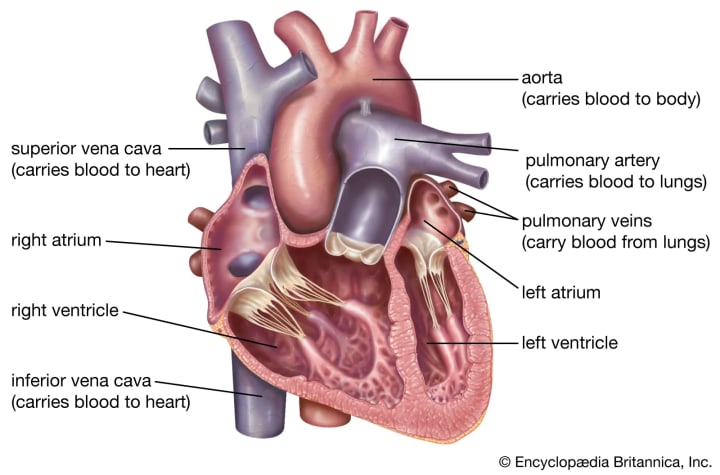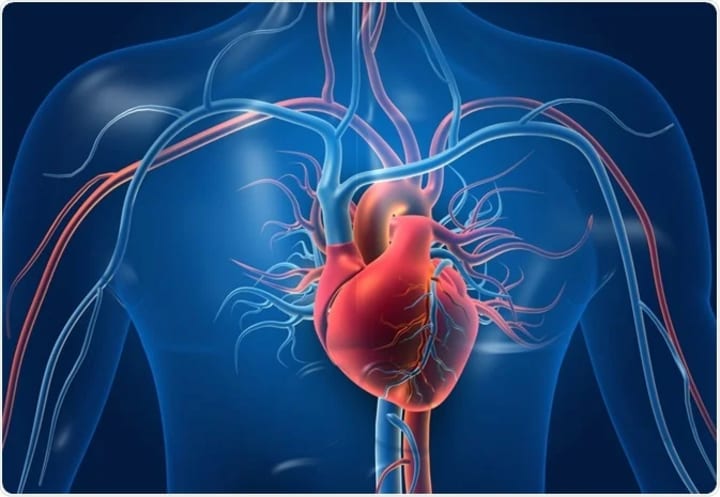the heart
the heart is the main organ of human ...nd we cant live without it


The heart is a vital organ in the human body that plays a crucial role in circulating blood throughout the body. It is a muscular organ located in the chest cavity, slightly to the left of the center of the chest. The heart is responsible for pumping oxygenated blood from the lungs to the rest of the body and returning deoxygenated blood back to the lungs for oxygenation.
Here are some key facts about the heart:
Structure: The heart is roughly the size of a closed fist and is composed of four chambers: two atria and two ventricles. The atria receive blood, while the ventricles pump blood out of the heart. The heart is enclosed in a protective sac called the pericardium.
Function: The primary function of the heart is to pump blood to deliver oxygen, nutrients, and hormones to various parts of the body. The heart contracts and relaxes in a rhythmic pattern known as the cardiac cycle, which generates the heartbeat.
Blood Flow: Blood flows through the heart in a specific pathway. Deoxygenated blood enters the right atrium from the body, then moves to the right ventricle, which pumps it to the lungs for oxygenation. Oxygenated blood returns to the left atrium from the lungs and is then pumped to the rest of the body through the left ventricle.
Coronary Circulation: The heart has its own blood supply called the coronary circulation. Coronary arteries provide oxygenated blood to the heart muscle itself, ensuring its proper function.
Electrical Conduction: The heart has a built-in electrical conduction system that controls the rhythm and coordination of its contractions. The sinoatrial (SA) node, located in the right atrium, initiates electrical signals, which then spread to the atrioventricular (AV) node and through specialized fibers, causing the heart to contract in a synchronized manner.
Heart Health: Maintaining a healthy heart is essential for overall well-being. Regular exercise, a balanced diet, managing stress, avoiding smoking, and maintaining a healthy weight are some lifestyle factors that contribute to heart health. Conditions such as coronary artery disease, heart failure, and arrhythmias can affect the heart's function and may require medical intervention.
It's important to note that while I can provide general information about the heart, if you have specific questions or concerns about your own heart health, it is always best to consult with a medical professional for accurate diagnosis and advice.
The heart is a vital organ in the human body responsible for pumping blood throughout the circulatory system. It is located in the chest, slightly left of the center. The heart is a muscular organ about the size of a fist, and it is composed of four chambers: two atria (upper chambers) and two ventricles (lower chambers).
The main function of the heart is to receive deoxygenated blood from the body and pump it to the lungs, where it picks up oxygen and gets rid of carbon dioxide. Oxygenated blood then returns to the heart, and the heart pumps it out to the rest of the body to supply oxygen and nutrients to the various organs and tissues.
The heart has a specialized electrical conduction system that controls its rhythm and ensures coordinated contractions. The sinoatrial (SA) node, also known as the natural pacemaker, initiates electrical impulses that cause the atria to contract. The electrical signals then travel to the atrioventricular (AV) node, which relays them to the ventricles, causing them to contract and pump blood out of the heart.
Several factors can affect heart health, including diet, exercise, smoking, genetics, and underlying medical conditions.

About the Creator
mahnoor rauf
HEY EVERYONE ...
I AM MAHNOOR ND I AM A STUDENT ND I JUST LOVE DOING THIS WORK BECAUSE IT GIVES ME MORE KNOWLODGE






Comments
There are no comments for this story
Be the first to respond and start the conversation.